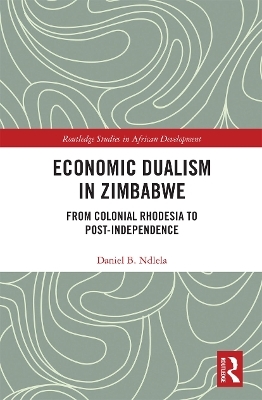
Economic Dualism in Zimbabwe
From Colonial Rhodesia to Post-Independence
Seiten
2020
Routledge (Verlag)
978-0-367-72970-7 (ISBN)
Routledge (Verlag)
978-0-367-72970-7 (ISBN)
This book identifies the root causes of income inequality in underdeveloped economies and proposes new solutions for structural reform in economies that have long neglected and exploited working people. It focuses on the case of Zimbabwe, a classic example of an African post-colonial state continuing with dualistic economic structures while simultaneously laying the blame for the initiation of this form of underdevelopment with colonialism. The book explores the colonial roots of economic dualism, in which traditional sectors run alongside newer forms of wage employment, and suggests ways for Zimbabwe to move beyond the ingrained inequalities and asymmetries in production and organisation that it generates.
Using a combination of theoretical and empirical approaches, Economic Dualism in Zimbabwe demonstrates how economic dualism can be eliminated through structural transformation of the traditional agricultural sector and reallocation of labour across sectors. The author comprehensively discusses the origins of dualism in Zimbabwe, how it developed in land, labour, credit and financial markets, who stands to gain and lose from it, and ultimately what reforms are needed to eliminate dualism from the economic system. The book aims to complement efforts made by both North and South to transform this structurally embedded cause of underdevelopment and seeks to motivate change in the collective development agenda mindset.
This book will be of interest to graduate-level students, scholars, researchers and policy practitioners in the fields of Development Studies, Economics, Agricultural Policy, Labour Policy, Economic Planning and African Studies.
Using a combination of theoretical and empirical approaches, Economic Dualism in Zimbabwe demonstrates how economic dualism can be eliminated through structural transformation of the traditional agricultural sector and reallocation of labour across sectors. The author comprehensively discusses the origins of dualism in Zimbabwe, how it developed in land, labour, credit and financial markets, who stands to gain and lose from it, and ultimately what reforms are needed to eliminate dualism from the economic system. The book aims to complement efforts made by both North and South to transform this structurally embedded cause of underdevelopment and seeks to motivate change in the collective development agenda mindset.
This book will be of interest to graduate-level students, scholars, researchers and policy practitioners in the fields of Development Studies, Economics, Agricultural Policy, Labour Policy, Economic Planning and African Studies.
Daniel B. Ndlela is a Lead Researcher and Team Leader with Zimconsult, Zimbabwe, formerly taught economics at the University of Zimbabwe, and was Senior Regional Adviser on economic co-operation and integration for the United Nations Economic Commission for Africa (UNECA).
1. Introduction 2. The Origins of Dualism in Zimbabwe 3. Land Tenure and Economic Dualism 4. Dualism in Agricultural Credit and Produce Markets 5. Economic Dualism in the Labour Market 6. The Theory of Economic Dualism 7. Dualism Theory Revisited 8. The Consequences of Economic Dualism 9. Destroying Dualism 10. Conclusions
| Erscheinungsdatum | 16.01.2021 |
|---|---|
| Reihe/Serie | Routledge Studies in African Development |
| Verlagsort | London |
| Sprache | englisch |
| Maße | 156 x 234 mm |
| Gewicht | 317 g |
| Themenwelt | Sozialwissenschaften ► Soziologie ► Spezielle Soziologien |
| Wirtschaft ► Volkswirtschaftslehre | |
| ISBN-10 | 0-367-72970-9 / 0367729709 |
| ISBN-13 | 978-0-367-72970-7 / 9780367729707 |
| Zustand | Neuware |
| Informationen gemäß Produktsicherheitsverordnung (GPSR) | |
| Haben Sie eine Frage zum Produkt? |
Mehr entdecken
aus dem Bereich
aus dem Bereich
Ressentiment in der Einwanderungsgesellschaft
Buch | Hardcover (2024)
Konstanz University Press (Verlag)
24,00 €
Erklärungsansätze für die geografische Varianz rechtspopulistischer …
Buch | Softcover (2025)
Springer Fachmedien Wiesbaden (Verlag)
84,99 €


